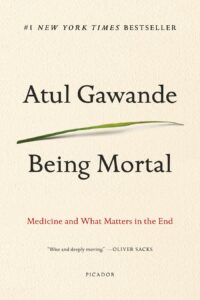Being Mortal

“Be where the client is at.”
This phrase – despite and because of its grammatical flaw – was written and spoken and repeated by several social work professors in my early graduate training. A willingness to refrain from my own agenda in order to respect and deeply probe the psychological space and experience of my therapy clients is essential to my own clinical practice. Clinicians employ therapeutic strategies that allow us to challenge and guide and inject theory. But at the core of effective therapeutic work, the clinician must possess the emotional flexibility to respect each client’s unique reality and perspective.
Atul Gawande’s magnificent bestselling book,Being Mortal: Medicine and What Matters in the End” frames an approach to end-of-life decision making and care that respects this essential social work guiding principle. A surgeon and staff writer for The New Yorker and a professor at Harvard Medical School, Gawande has authored several bestselling books. Being Mortal explores how the trajectory of modern medicine’s success revolutionizing the dangers of birth and management of disease has evolved to a pattern of extending life above all else. Sometimes life is extended with blatant or even negligent disregard for patient preferences and priorities.
The problem with medicine and the institutions It has spawned for the care of the sick and the old is not that they have had an incorrect view of what makes life significant. The problem is that they have had almost no view at all. Medicine’s focus is narrow. Medical professionals concentrate on repair of health, not sustenance of the soul. Yet – and this is the painful paradox – we have decided that they should be the ones who largely define how we live in our waning days. For more than a century now, we have treated the trials of sickness, aging, and mortality as medical concerns. It’s been an experiment in social engineering, putting our fates in the hands of people valued more for their technical prowess than for their understanding of human needs.
Gawande masterfully challenges this default experiment. He points to creative approaches to senior living like infusing care facilities with plants and pets and farm animals. He does a deep and illuminating dive into hospice care and calls for providers to take the time to explore and respect each patient’s priorities. He features the palliative care specialist Susan Block as a moral compass with the potential to reframe the approach to end of life care:
“You have to understand,” Block told me. “A family meeting is a procedure, and it requires no less skill than performing an operation.” One basic mistake is conceptual. To most doctors, the primary purpose of a discussion about terminal illness is to determine what people want – whether they want chemo or not, whether they want to be resuscitated or not, whether they want hospice or not… “A large part of the task is helping people negotiate the over-whelming anxiety – anxiety about death, anxiety about suffering, anxiety about loved ones, anxiety about finances…” No one conversation can address them all. Arriving at an acceptance of one’s mortality and a clear understanding of the limits and the possibilities of medicine is a process, not an epiphany…The words you use matter. According to palliative specialists, you shouldn’t say, “I’m sorry things turned out this way,” for example, it can sound like you are distancing yourself. You should say, “I wish things were different.” You don’t ask, “What do you want when you are dying?” You ask, “If time becomes short, what is most important to you?”
Gems of knowledge like the above quotations are laced throughout Being Mortal’s brave mining of the difficult topic of terminal illness and the near taboo topics of dying and death. This difficult, illuminating, transformational read enhances my clinical skills and reminds me that being where the client is at is a lifelong, essential goal.
